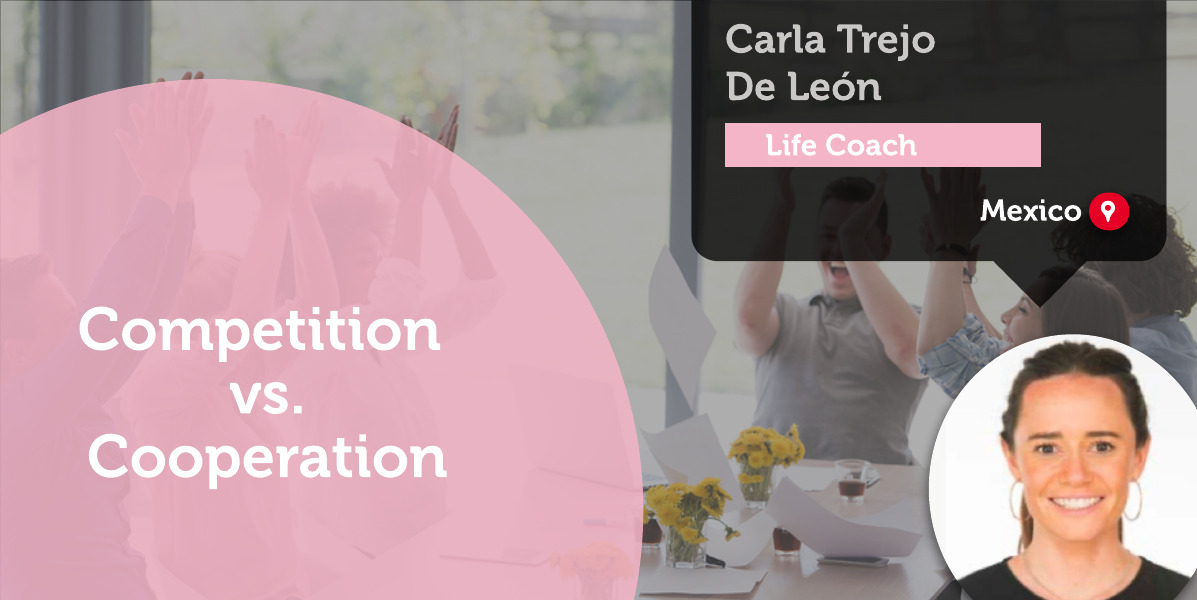A Coaching Power Tool By Carla Trejo De León, Life Coach, MEXICO

Have you ever felt exhausted from competing with everyone all the time? In this world competition is everywhere: in school, at work, on the road, in the gym, and more.
While competition can motivate people to work their hardest and bring out their best performance, it can also cause negative effects that could stop them from moving forward.
People seem to think that by competing against others, they will learn how to improve and gain success. They may even think that to gain other’s respect, they need to demonstrate they have beaten the competition.
When competition is limiting clients from moving forward, coaches can assist by reframing their perspective to cooperation to find ways to overcome their obstacles and achieve their goals.
Many people think that it’s better to compete than to cooperate because when cooperating with others there is a chance their ideas could get stollen, criticized, or belittled.
The thing is, the more people compete, the harder competition could get.
The article “When Winning Doesn’t Mean Coming in First” (Competition vs. Cooperation) mentions that competition is deleterious in many ways.
- With children, competition serves to dissolve self-confidence and spread self-doubt, even among frequent winners who learn to become dependent on external sources of validation.
- Among adults, competition leads directly to hostility and greed, both of which are the enemies of progress.
The Negative Effect of Competition:
- Lower self-esteem: Competition could cause low self-esteem because a big part of the workforce might not get recognized. And if it’s not getting recognized, there is a possibility the competitor could start experiencing fear and anxiety: fear that could disappoint themselves, their boss, or coworkers.
- Focus on the wrong things: Competition can create an environment where people are focused more on their competitors than on their own work. When competitors are focused “too much” on other people’s work, then they limit themselves from coming up with new ideas. Competitors keep focused on how coworkers are doing, rather than doing their personal best.
- Work/life imbalance: Competition can also breed an unhealthy outlook on the work/life balance. How? By feeling so much pressure to succeed at work that they: 1) spend too much time at the office, 2) work while they’re at home with their family in the evenings, or 3) give up other interests and hobbies to make time for work.
Important Differences Between Competition vs. Cooperation
As coaches, we can help clients make positive shifts by bringing the perspective of cooperation when competing is limiting them from moving forward. True cooperation can benefit people in several ways. People who work together are more likely to increase production and innovate, usually in ways more advanced than competition allows. By working together, employees, family, and friends develop a network of stress release that helps them maintain a positive environment.
Even though friendly competition can be enjoyed now and again, clients can build a stronger, more contented, wealthier, and all-around happier environment by cooperating at school, at work, and at home.
Cooperation can free our client to enjoy more of life and be more effective when facing his or her everyday challenges.
Potential Questions Could Include:
- What is the danger here?
- What are you really worried about?
- What is holding you back?
- What could you do instead of competing?
- What would it feel like to cooperate instead of competing?
- How do you feel when you cooperate with others?
- Who are you when you cooperate with others?
References
https://ideas.baudville.com/the-baudville-blog/three-negative-effects-of-competition-in-recognition
https://www.skillsyouneed.com/rhubarb/competition-vs-cooperation.html